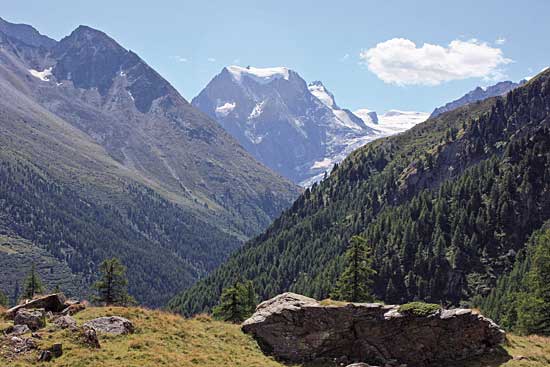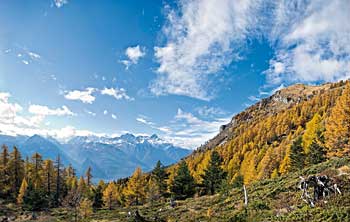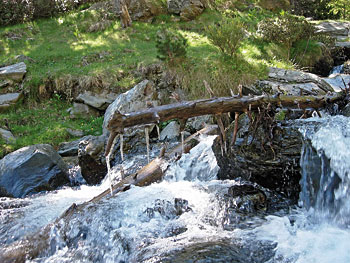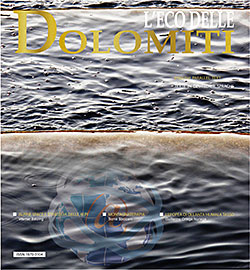THE ALPINE CONVENTION AND THE MACRO-REGION "ALPINE SPACE" OF THE EUROPEAN UNION.
Deliberations on the problem of the alpine border in reference to the development of a "Strategy of the Alps"
Werner Bätzing

 The current crisis of the Alpine Convention (AC) gives rise to reflections on the necessity of leaving the instrument of the Convention to encourage instead the development of a "Strategy of the Alps", in the framework of the macro-region of the European Union, the "Alpine Space". However this would cause significant consequences for the Alps: The current crisis of the Alpine Convention (AC) gives rise to reflections on the necessity of leaving the instrument of the Convention to encourage instead the development of a "Strategy of the Alps", in the framework of the macro-region of the European Union, the "Alpine Space". However this would cause significant consequences for the Alps:
While the Convention circumscribes the Alpine regions, according to the common-sense (190,000 sq km, 14 million people), the European Union identified them in the "Alpine Space Programme" as a wider area covering 450,000 square kilometers with 70 million inhabitants. This means that the extra-alpine metropolis near the borders of the Alps – such as Vienna, Munich, Zurich, Milan, etc.. - dominate and define very clearly the true alpine area with regard to population, jobs and votes.
However, this does not disagree with the concept of macro-regions of the European Union: a concept that was developed by the European Union since the early '80s ("Europe 2000" in 1991 and "Europe 2000+" in 1995), on one side to define the regions whose problems are of a transnational nature, and on the other side to reassess the regional trans-boundary potentials. After the establishment of the Convention, in the first documents the Alps, the area of the North Sea or of the Baltic Sea were often referred to as macro-regional units. This development culminated in 1999 with the adoption of the "European Spatial Development Perspective ESDP", but the real debate on macro-regions of the EU has stopped abruptly with the exception of the Baltic Sea. With the Treaty of Lisbon, held on the 1st of December 2009, the "territorial cohesion" in the European Union is set for the first time among the regulatory objectives of the EU ("Territorial Agenda"), and this revaluates once again the macro-regions, though it is still unclear how the achievement should be carried out.
 In the current situation, deeply influenced by neo-liberal ideas, there is a tendency to consider the macro-regions of the European Union as a catchment area of several European towns (metropolitan central areas plus "their" surrounding areas), rather than as a sort of international metropolitan regions. This interpretation clearly diverges from the original intent of the EU, that is that the division of Europe into macro-regions should assemble areas with similar problems and the same potentials, whether it be in metropolitan or not-urban areas, according to the aims of the project "Europe 2000+". The Alps clearly show this difference : according to the Convention only the Alps can be defined as areas with specific common potentials and problems and not the wider "Alpine Space", the area that was added to the Alps and which represents, on the contrary, completely different situations. In the current situation, deeply influenced by neo-liberal ideas, there is a tendency to consider the macro-regions of the European Union as a catchment area of several European towns (metropolitan central areas plus "their" surrounding areas), rather than as a sort of international metropolitan regions. This interpretation clearly diverges from the original intent of the EU, that is that the division of Europe into macro-regions should assemble areas with similar problems and the same potentials, whether it be in metropolitan or not-urban areas, according to the aims of the project "Europe 2000+". The Alps clearly show this difference : according to the Convention only the Alps can be defined as areas with specific common potentials and problems and not the wider "Alpine Space", the area that was added to the Alps and which represents, on the contrary, completely different situations.
The strategic plan for macro-regions developed by the EU is useful but to further improve it, the EU should reduce the "Alpine Space" to the previous geographical scope set by the Convention. The work in favor of a "Strategy of the Alps" has precisely the same challenges of the Alpine Convention, and hence it might greatly benefit of its preparatory works - in favor of the Alps and of the European Union macro-regions.
 For the development of a "Strategy of the Alps" (12th of February 2010, in Mittenwald) the policy statement requires that particular importance is given to the integration of the central area of the Alps and the extra-alpine metropolitan areas. This is right and necessary, but it does not arise, however, against the delimitation of the Alps according to the Convention, on the contrary it is complimentary: only if the Alps are united under the Alpine Convention, they could discuss with the extra-alpine cities (whose metropolitan regions expand in the Alps) on the issues of a territorial development and of an integration design. On the contrary, if the Alps were broadly defined as "Alpine Space", the partners of the discussion would become the main metropolitan towns and the small and weak alpine villages. For the development of a "Strategy of the Alps" (12th of February 2010, in Mittenwald) the policy statement requires that particular importance is given to the integration of the central area of the Alps and the extra-alpine metropolitan areas. This is right and necessary, but it does not arise, however, against the delimitation of the Alps according to the Convention, on the contrary it is complimentary: only if the Alps are united under the Alpine Convention, they could discuss with the extra-alpine cities (whose metropolitan regions expand in the Alps) on the issues of a territorial development and of an integration design. On the contrary, if the Alps were broadly defined as "Alpine Space", the partners of the discussion would become the main metropolitan towns and the small and weak alpine villages.
The Convention should not be regarded only as a political "island" whose scopes stop abruptly to the Alps, but it must also deal with questions related to integration with extra-alpine areas (even if for this the AC hasn't carried out the necessary protocols). In order to equally perform this discussion, the Alps, politically divided, must be considered as a region with homogeneous problems and potentials, which should not be joined to entirely different areas, as it would be crushed by their overwhelming demographic, economical and political strength.
|
 NUMBER 11
NUMBER 11

 NUMBER 11
NUMBER 11
